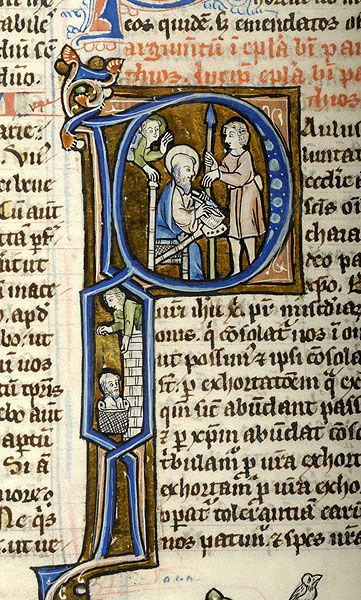Friday of the 24th Week in Ordinary Time
Here is the latest from Fr Marcelo. His explanation of the technique of lectio divina is here:
As he usually does, in just a few lines, Aquinas provides ample material for meditation. I will dwell on a couple of verses from today’s reading and St. Thomas comments on it.1
Let us just consider verses 3 to 5:
Whoever teaches something different
and does not agree with the sound words of our Lord Jesus Christ
and the religious teaching
is conceited, understanding nothing,
and has a morbid disposition for arguments and verbal disputes.
From these come envy, rivalry, insults, evil suspicions,
and mutual friction among people with corrupted minds,
who are deprived of the truth,
supposing religion to be a means of gain.
It is not difficult to grasp the main two ideas of this piece of the Scriptural text: first, no one can teach something different from the teachings of Christ at the risk of having understood nothing of it; and second, many sins follow from such an attitude.
- No one can teach a wrong doctrine. Here, St. Thomas shows:
- The method of a false doctrine
- The root of it
- Its effect
The method of a false doctrine. A doctrine is wrong: first, if it is against the ecclesiastical doctrine. See Gal 1: 9: if anyone preaches to you a gospel other than the one that you received, let that one be accursed! In fact, says St. Thomas, the doctrine of the Apostles and prophets is canonical, compared to a “rule of our intellect”.
Second, Aquinas comments on, [whoever] does not agree with the sound words of our Lord Jesus Christ [or does not follow the “healthy words”]. In fact, the Lord has come to bear testimony to the truth, Jn 18: 37: For this, I was born and for this I came into the world, to testify to the truth. He was sent by the Father as doctor and teacher. His words are “sane” –sound, healthy- because in his words there is nothing corrupt, nothing false, nothing pervert, because His are the discourses of divine wisdom (cf. Prov 8: 8ff., All the words of my mouth are sincere, none of them wily or crooked…).
Third, doctrine [should be] according to piety –as learned from one’s father’s commands and one’s mother’s teachings. The ecclesiastical doctrine is exercised through the worship of God: for the sake of the faith of God’s chosen ones and the recognition of religious truth [piety], (Ti 1: 1).
The root of a false doctrine. The root of this is double: the feeling of pride and the lack of intelligence.
Regarding pride, the proud knows nothing and is blinded by hatred. Pride is the root of error in two ways:
a) because the proud wants to interfere with a thing he does not understand, therefore he fails, and,
b) because he does not want to submit his intelligence to another by judging only on his own prudence, and he does not want to obey the Scriptures.
Regarding the lack of intelligence, Aquinas says that truth consists in certain similarity with the intellect since truth is the correspondence between the thing and the intellect. Therefore, when man is not founded on truth, he does not have the capacity to judge of the truth, and falls into error before difficult matters, (cf. 2 Tim 3: 7: always trying to learn but never able to reach a knowledge of the truth.) That is why, those who do not understand, fall prey to a morbid disposition for arguments and verbal disputes, such is the case of doubts and the dissension that comes from words.
The effect of a false doctrine. The effects of error are envy, rivalry, insults, evil suspicions, and mutual friction among people with corrupted minds, who are deprived of the truth, supposing religion to be a means of gain.
Some of the evils that follow are interior (in the heart), and some are exterior. Interiorly, they are the inordinate movements:
a) regarding good (envy, which is sadness about the good of others; through envy man goes against his neighbor, and that is rivalry; or against God, and that is blasphemy (here translated as insults);
b) regarding evil (evil suspicions, from which follows conflicts -mutual frictions-). But this takes place not in the hearts of all, but of some only, i.e. in the hearts of:
-
those who lack the natural light (meaning having corrupt minds or perverted judgment, cf. Ps 13: 1): -among people with corrupted minds-;
-
those who lack knowledge – who are deprived of the truth-, cf. Hos 4: 1;
-
those with an inordinate inclination to vice, as those who consider religion to be a means of gain as if the worship of God was meant to obtain profit and to acquire riches.
Those who fall under these categories, who believe these things, easily despise others and fall into the above-mentioned evils.
Once again, St. Thomas has dissected the Scriptural text –with the Spirit in which it was written, as Scriptures should be always read-, and has provided abundant material for our daily meditation of the divine Word (lectio divina).
I hope that this explanation will be of help to follow the five steps of lectio divina: lectio, meditatio, oratio, contemplatio and actio (without which our prayer remains empty). Therefore, let us draw a resolution or two to put it into practice. God bless you.
Fr. Marcelo J. Navarro Muñoz, IVE
1 S. TOMMASO D’AQUINO, Commento al Corpus Paulinum (Expositio et lectura super epistolas Pauli Apostoli). Vol. 5, Edizioni Studio Domenicano, Bologna, Italy, 2008. My translation.

